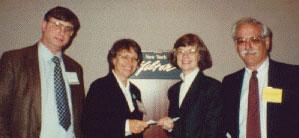Awards
Ralph D. Gray Prize
Assistant editor Tyson F. Reeder's article "Liberty with the Sword: Jamaican Maroons, Haitian Revolutionaries, and American Liberty," Journal of the Early Republic 37 [2017]: 81-115 received the 2017 Ralph D. Gray Prize for best article appearing in the Journal of the Early Republic.
Reeder's article examines changing Anglo Atlantic perceptions of Jamaican maroons and the "legitimacy of black resistance" after the 1739 treaty ending the First Maroon War. After initially viewing maroons as "legitimately free people" and "able allies in the maintenance of order and slavery," Americans between the 1790s and the U.S. Civil War began to "abandon the notion that treating with an indomitable community of blacks could lend stability to a slave society." Unsurprisingly, slavery advocates and slavery detractors viewed the maroons through different lenses, as "a drastic reconceptualization of slave resistance" arose. Reeder's award-winning article offers "new insight into the links between Haiti's influence on discussions about slave resistance, Anglo Atlantic conceptions of liberty, and collective memory."
Moncado Prize
The Society for Military History awarded a 2015 Moncado Prize (now called the Vandervort Prize) to Papers of James Madison editor in chief J. C. A. Stagg for "Freedom and Subordination: Disciplinary Problems in the U.S. Army during the War of 1812," Journal of Military History 78 (2014): 537-74. These awards recognize the authors of the four best articles published in the Journal of Military History each year.
"This essay examines the general court martial case files for enlisted men in the War of 1812. The defendants were a reasonably representative cross section of the enlisted men, desertion was the most frequent offense, and mistreatment by officers was the most common motive for deserting. Most defendants proclaimed their innocence, but guilt and conviction were invariably the outcome in their trials. Officers struggled to find effective punishments. The abolition of corporal punishment by the lash in 1812 reduced the army's disciplinary options, resulting in an increasing recourse to the death penalty. The army, however, shrank from executing all the condemned."
Arthur S. Link Prize

The Papers of James Madison: Secretary of State Series, Vol. 2, was awarded the 1996 Arthur S. Link Prize (now called the Link-Kuehl Prize) from the Society for Historians of American Foreign Relations.
This prize, awarded at the 1996 annual meeting of the American Historical Association, "recognizes not only the high level of scholarship and erudition present in the publication of the James Madison papers, but the overall contribution to history." Pictured, left to right, are J. C. A. Stagg, editor in chief of the Papers of James Madison; Emily Rosenberg, president of SHAFR; Mary A. Hackett, editor of the prize-winning volume; and Alan Spetter, secretary/treasurer of SHAFR.
Outstanding Academic Books for 1996

Senior associate editor David B. Mattern's Benjamin Lincoln and the American Revolution was selected for the CHOICE list of Outstanding Academic Books for 1996.
"In this definitive biography of one of America's most important but least known Revolutionary War generals, . . . Mattern tells the life story of Benjamin Lincoln, a prosperous farmer who left the comfort of his Massachusetts home to become a national hero in America's struggle for independence. Mattern's account of the citizen-soldier who served as George Washington's second-in-command at Yorktown and as secretary at war from 1781 to 1783 revisits the challenges, sacrifices, triumphs, and defeats that shaped Lincoln's evolution from affluent middle-aged family man to pillar of a dynamic republic. In addition to offering new insights into leadership during the revolutionary period, Lincoln's life so mirrored his times that it provides an opportunity to tell the tale of the American Revolution in a fresh, compelling way."